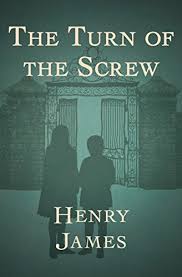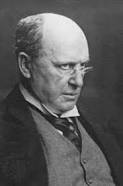The Turn of the Screw Page #6
The Turn of the Screw is an 1898 horror novella by Henry James that first appeared in serial format in Collier's Weekly magazine. In October 1898 it appeared in The Two Magics, a book published by Macmillan in New York City and Heinemann in London.
In the first weeks the days were long; they often, at their finest, gave me what I used to call my own hour, the hour when, for my pupils, teatime and bedtime having come and gone, I had, before my final retirement, a small interval alone. Much as I liked my companions, this hour was the thing in the day I liked most; and I liked it best of all when, as the light faded—or rather, I should say, the day lingered and the last calls of the last birds sounded, in a flushed sky, from the old trees—I could take a turn into the grounds and enjoy, almost with a sense of property that amused and flattered me, the beauty and dignity of the place. It was a pleasure at these moments to feel myself tranquil and justified; doubtless, perhaps, also to reflect that by my discretion, my quiet good sense and general high propriety, I was giving pleasure—if he ever thought of it!—to the person to whose pressure I had responded. What I was doing was what he had earnestly hoped and directly asked of me, and that I could, after all, do it proved even a greater joy than I had expected. I daresay I fancied myself, in short, a remarkable young woman and took comfort in the faith that this would more publicly appear. Well, I needed to be remarkable to offer a front to the remarkable things that presently gave their first sign. It was plump, one afternoon, in the middle of my very hour: the children were tucked away, and I had come out for my stroll. One of the thoughts that, as I don’t in the least shrink now from noting, used to be with me in these wanderings was that it would be as charming as a charming story suddenly to meet someone. Someone would appear there at the turn of a path and would stand before me and smile and approve. I didn’t ask more than that—I only asked that he should know; and the only way to be sure he knew would be to see it, and the kind light of it, in his handsome face. That was exactly present to me—by which I mean the face was—when, on the first of these occasions, at the end of a long June day, I stopped short on emerging from one of the plantations and coming into view of the house. What arrested me on the spot—and with a shock much greater than any vision had allowed for—was the sense that my imagination had, in a flash, turned real. He did stand there!—but high up, beyond the lawn and at the very top of the tower to which, on that first morning, little Flora had conducted me. This tower was one of a pair—square, incongruous, crenelated structures—that were distinguished, for some reason, though I could see little difference, as the new and the old. They flanked opposite ends of the house and were probably architectural absurdities, redeemed in a measure indeed by not being wholly disengaged nor of a height too pretentious, dating, in their gingerbread antiquity, from a romantic revival that was already a respectable past. I admired them, had fancies about them, for we could all profit in a degree, especially when they loomed through the dusk, by the grandeur of their actual battlements; yet it was not at such an elevation that the figure I had so often invoked seemed most in place. It produced in me, this figure, in the clear twilight, I remember, two distinct gasps of emotion, which were, sharply, the shock of my first and that of my second surprise. My second was a violent perception of the mistake of my first: the man who met my eyes was not the person I had precipitately supposed. There came to me thus a bewilderment of vision of which, after these years, there is no living view that I can hope to give. An unknown man in a lonely place is a permitted object of fear to a young woman privately bred; and the figure that faced me was—a few more seconds assured me—as little anyone else I knew as it was the image that had been in my mind. I had not seen it in Harley Street—I had not seen it anywhere. The place, moreover, in the strangest way in the world, had, on the instant, and by the very fact of its appearance, become a solitude. To me at least, making my statement here with a deliberation with which I have never made it, the whole feeling of the moment returns. It was as if, while I took in—what I did take in—all the rest of the scene had been stricken with death. I can hear again, as I write, the intense hush in which the sounds of evening dropped. The rooks stopped cawing in the golden sky, and the friendly hour lost, for the minute, all its voice. But there was no other change in nature, unless indeed it were a change that I saw with a stranger sharpness. The gold was still in the sky, the clearness in the air, and the man who looked at me over the battlements was as definite as a picture in a frame. That’s how I thought, with extraordinary quickness, of each person that he might have been and that he was not. We were confronted across our distance quite long enough for me to ask myself with intensity who then he was and to feel, as an effect of my inability to say, a wonder that in a few instants more became intense. The great question, or one of these, is, afterward, I know, with regard to certain matters, the question of how long they have lasted. Well, this matter of mine, think what you will of it, lasted while I caught at a dozen possibilities, none of which made a difference for the better, that I could see, in there having been in the house—and for how long, above all?—a person of whom I was in ignorance. It lasted while I just bridled a little with the sense that my office demanded that there should be no such ignorance and no such person. It lasted while this visitant, at all events—and there was a touch of the strange freedom, as I remember, in the sign of familiarity of his wearing no hat—seemed to fix me, from his position, with just the question, just the scrutiny through the fading light, that his own presence provoked. We were too far apart to call to each other, but there was a moment at which, at shorter range, some challenge between us, breaking the hush, would have been the right result of our straight mutual stare. He was in one of the angles, the one away from the house, very erect, as it struck me, and with both hands on the ledge. So I saw him as I see the letters I form on this page; then, exactly, after a minute, as if to add to the spectacle, he slowly changed his place—passed, looking at me hard all the while, to the opposite corner of the platform. Yes, I had the sharpest sense that during this transit he never took his eyes from me, and I can see at this moment the way his hand, as he went, passed from one of the crenelations to the next. He stopped at the other corner, but less long, and even as he turned away still markedly fixed me. He turned away; that was all I knew.
Translation
Translate and read this book in other languages:
Select another language:
- - Select -
- 简体中文 (Chinese - Simplified)
- 繁體中文 (Chinese - Traditional)
- Español (Spanish)
- Esperanto (Esperanto)
- 日本語 (Japanese)
- Português (Portuguese)
- Deutsch (German)
- العربية (Arabic)
- Français (French)
- Русский (Russian)
- ಕನ್ನಡ (Kannada)
- 한국어 (Korean)
- עברית (Hebrew)
- Gaeilge (Irish)
- Українська (Ukrainian)
- اردو (Urdu)
- Magyar (Hungarian)
- मानक हिन्दी (Hindi)
- Indonesia (Indonesian)
- Italiano (Italian)
- தமிழ் (Tamil)
- Türkçe (Turkish)
- తెలుగు (Telugu)
- ภาษาไทย (Thai)
- Tiếng Việt (Vietnamese)
- Čeština (Czech)
- Polski (Polish)
- Bahasa Indonesia (Indonesian)
- Românește (Romanian)
- Nederlands (Dutch)
- Ελληνικά (Greek)
- Latinum (Latin)
- Svenska (Swedish)
- Dansk (Danish)
- Suomi (Finnish)
- فارسی (Persian)
- ייִדיש (Yiddish)
- հայերեն (Armenian)
- Norsk (Norwegian)
- English (English)
Citation
Use the citation below to add this book to your bibliography:
Style:MLAChicagoAPA
"The Turn of the Screw Books." Literature.com. STANDS4 LLC, 2025. Web. 8 Mar. 2025. <https://www.literature.com/book/the_turn_of_the_screw_330>.








Discuss this The Turn of the Screw book with the community:
Report Comment
We're doing our best to make sure our content is useful, accurate and safe.
If by any chance you spot an inappropriate comment while navigating through our website please use this form to let us know, and we'll take care of it shortly.
Attachment
You need to be logged in to favorite.
Log In